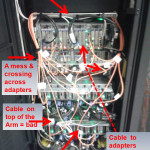Fuel Management Software for Reducing Fossil Fuel Reliance
Fossil fuels must slowly make their way out of use if the United States and the world are to heal from the climate crisis. This movement, though, is still in its infancy, trying to gain traction and become something bigger. In the meantime, it’s critical to reduce fossil fuel reliance wherever possible, thus reducing emissions in the process.
Fuel management software is one of the key places to focus. Trucks and entire fleets consume copious amounts of fossil fuels every year. In fact, transportation accounted for 28% of all greenhouse gas emissions in 2018, the most of any sector. Thus, it’s important for this industry to take immediate action.
Fleets rely on fossil fuels but can also be incredibly wasteful in consumption. With vehicles idling or making unnecessary trips, trucks can quickly waste fossil fuels and money, giving off excess emissions in the process.

Fortunately, newer technologies can help managers monitor and track fuel consumption. From there, they can pinpoint ways to reduce spending on fuel, which reduces emissions as well. Ultimately, as this technology helps decrease reliance on fossil fuels, it should also help the transportation industry collectively move towards cleaner resources.
Using Fossil Fuels More Efficiently
The first step to reducing fossil fuel reliance is through more efficient use and less waste. This dynamic helps trucking companies and individuals save money while they produce fewer harmful emissions. Software facilitates this change. This tech involves sensors and GPS trackers that report the data of trips, spending, and fuel consumption.
From this data, fleet managers and drivers can first and foremost reduce fossil fuel waste. Every year, idling vehicles emit about 11 million tons of carbon dioxide. As the fuel management sensors track how long each vehicle idles, drivers can act accordingly and turn off the vehicle when appropriate.
Fuel waste can also happen during prolonged or excess trips. If truckers drive back and forth, they’ll be giving off unnecessary emissions and wasting money. Again, fuel management software can help, as it uses GPS to track each trip and see which stops are necessary and which are not. Managers can then find the best tactics and routes to carry out deliveries without relying as much on fuels.
Last, theft can play a role in fossil fuel reliance as well. If thieves steal trucks or company card information, they can rack up charges in fuel. For instance, fuel skimming occurs when criminals replace a gas station card reader with a fraudulent one that steals information. Real-time fuel analytics and GPS trackers show any suspicious activity in locations or in fuel consumption for each vehicle.
With this tech in place, fleets can reduce their fuel consumption and their overall fossil fuel reliance.
Phasing Out the Fuels
Cleaner energy sources are readily available for use across industries. Solar and wind are no doubt the biggest. Other sources are growing quickly, too — hydropower generated 7% of all U.S. energy in 2019. For transportation, electric vehicles are now the main focus for clean alternatives.
The biggest obstacles are the costs and integration of these vehicles. However, making the switch is ultimately necessary. With some states like California mandating that new vehicles cannot be gas-powered starting in 2035, the industry needs to start making changes now. Fortunately, fuel management software is again invaluable.
The same sensors and trackers that monitor fossil fuel consumption can apply to electric vehicles. They’ll track charges and mileage in a similar fashion, so managers can still get the best savings possible.
Paired with the drastic benefits for the environment, fuel management software can help the transportation industry completely reduce its reliance on fossil fuels as it moves to cleaner sources. In the process, the software will help fleets and individuals save money.
The Two-Step Approach
Reducing reliance on fossil fuels through the use of fuel management software is a two-step process. First, the transportation industry can use this tech to reduce overall fossil fuel consumption. Then, with the transition to cleaner energy sources, fleets can keep using this software to save on electric vehicle costs as well.
The result is a more environmentally-friendly industry. And the process can start now.


![Why Are Keywords So Important for Your Online Sales? [Infographic]](https://technofaq.org/wp-content/uploads/2017/11/Why_Are_Keywords_So_Important_for_Your_Online_Sales-150x150.png)








